
- Cheikh Anta Diop – Civilisation ou Barbarie
- Aimé Césaire – Discours sur le colonialisme
- Adame Ba Konaré – L’os de la parole
- Fabien Eboussi Boulaga – La crise du Muntu
- Bernard Mouralis – L’Europe, l’Afrique et la folie
Cheikh Anta Diop – Civilisation ou Barbarie
An Authentic Anthropology
– Anthropology –
|
Summary: Challenging societal beliefs, this volume rethinks African and world history from an Afrocentric perspective: this last work of the well-known Senegalese scholar (1923-86) is a summation and expansion of his two previous volumes– Precolonial Black Africa (1987) and The African Origin of Civilization (1974). « Diop offers a Critical challenge to orthodox scholarship’s interpretation of Egypt as a White civilization, which arose during the nineteenth century to reinforce European racism and imperialism. Amassing evidence from the linguistic to the archaeological, from the historical to the philosophical, he demonstrates that Egypt was a Black civilization and that Blacks are the rightful heirs to Egypt’s proud legacy. Moreover, he shows through superbly detailed documentation that Greek civilization, long revered as the birthplace of Western thought, owes a substantial debt to Egyptian ideas and accomplishments.« —Dr. Leonard Jefferies, Jr., Professor of Africana Studies, City College of New York 2023 is Cheikh Anta Diop’s 100th years birth anniversary |
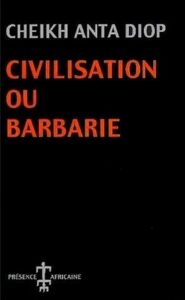 |
|
Publication: Présence Africaine, 1981 Bio: Cheikh Anta Diop (29 December 1923 – 7 February 1986) was a Senegalese historian, anthropologist, physicist, and politician who studied the human race’s origins and pre-colonial African culture. Diop’s work is considered foundational to the theory of Afrocentricity, though he himself never described himself as an Afrocentrist. The questions he posed about cultural bias in scientific research contributed greatly to the postcolonial turn in the study of African civilizations. Diop argued that there was a shared cultural continuity across African people that was more important than the varied development of different ethnic groups shown by differences among languages and cultures over time. Some of his ideas have been criticized as based upon outdated sources and an outdated conception of race. Other scholars have defended his work from what they see as widespread misrepresentation. Cheikh Anta Diop University (formerly known as the University of Dakar), in Dakar, Senegal, is named after him. Link to the book on Présence Africaine: Here Rights inquiries: Here |
|
Aimé Césaire – Discours sur le colonialisme
– Discourse on Colonialism –
|
Summary: Discourse on Colonialism serves as a foundational text of postcolonial literature that discusses what Césaire described as the appalling affair of the European civilizing mission. Rather than elevating the non-Western world, the colonizers de-civilize the colonized, states Césaire. Through his writing and poetry, Cesaire represents a decisive influence for African and Black American intellectuals in their fight against colonialism & acculturation.
|
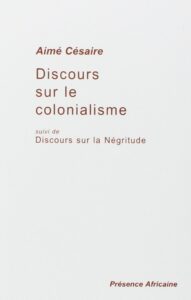 |
|
Publication: Présence Africaine, 1955 Bio: Aimé Césaire (26 June 1913 – 17 April 2008) was a French poet, author, and politician. He was « one of the founders of the Négritude movement in Francophone literature » and coined the word négritude in French. He founded the Parti progressiste martiniquais in 1958, and served in the French National Assembly from 1945 to 1993 and as President of the Regional Council of Martinique from 1983 to 1988. His works include the book-length poem Cahier d’un retour au pays natal (1939), Une Tempête, a response to Shakespeare’s play The Tempest, and Discours sur le colonialisme (Discourse on Colonialism), an essay describing the strife between the colonizers and the colonized. His works have been translated into many languages. Link to the book on Présence Africaine: Here Rights inquiries: Here |
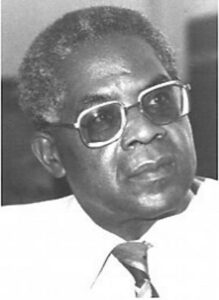
© Présence Africaine |
|
Adame Ba Konaré – L’os de la parole
Cosmologie du pouvoir
– Politics –
|
Summary: In this masterful essay based on her research and experience as First Lady of Mali and activist of the Democratic Movement and Human Rights of Mali, Adame Ba Konaré offers us a theory of power that she believes replicates the cosmic order. Taking up Einstein’s general theory of relativity, she modifies important values such as democracy and invites the promotion of a triptych concept: humilitarism, measureism, solidarity. L’os de la Parole is a real guide, capable of inspiring anyone who wants to try their hand at the complex exercise of power.
|
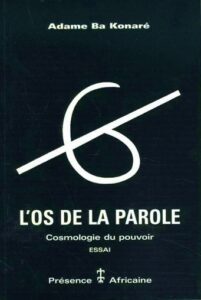 |
|
Publication: Présence Africaine, 2001 Bio: Adame Ba Konaré (born 1 May 1947 in Segu, Mali) is a Malian historian and writer who is married to Alpha Oumar Konaré, former President of Mali. She is active in several causes for newborns and refugees. She is also an outspoken feminist & the founder of one of the few women’s museums in Africa. Link to the book on Présence Africaine: Here Rights inquiries: Here |
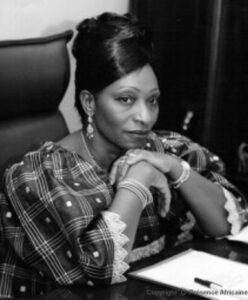
© Présence Africaine |
Fabien Eboussi Boulaga – La crise du Muntu
Authenticité africaine et philosophie
– Philosophy & Theology –
|
Summary: How could Muntu, that is the human being in the African condition, initiate/found a practice of philosophy that assumes and testifies to the singularity of the African situation today and assert himself as subject and object of his parole? Under which conditions can his practice of philosophy be a praxis of liberation, and his discourse constitute itself for self, by imparting to itself, in form and content, the language of one s own history, that is the unfolding of its historical reason or reasonable history? These are the fundamental and existential questions at the heart of Muntu in Crisis, which is undoubtedly the most original work in the field of African Philosophy in the 20th century. In facing these questions, Fabien Eboussi Boulaga undertakes to lay out the foundations of a rigorous African philosophical practice, free from the burdens of the rationality which, by rejecting sentiment, color, history, accident and the local, manifested itself as another name of violence or war, not only spiritual but real. Eboussi Boulaga demounts the grammar and the rhetoric of ethnophilosophy, this thrill of the colonized subject claiming to possess philosophies and engaged in the reconstruction of a lost or denied authenticity, while losing sight of the suffered alienation. In the same vein, he rejects the traditionalized philosophy, that is philosophia perennis, intimately linked to the history of the West and to which the Muntu must conform by renouncing his own memory, traditions and desires. Finally, without pretending to prescribe a method, Fabien Eboussi Boulaga shows how, instead of being a dramatization of the situation of the colonized or the allegory of the power of the colonizer, the Muntu s practice of philosophy can be a practice of emancipation and freedom, and a creative practice that assumes all his historical determinations. |
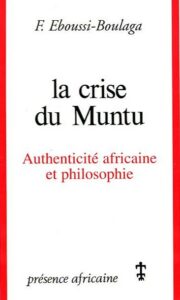 |
|
Publication: Présence Africaine, 1977 Bio: Fabien Eboussi Boulaga was a leading Cameroonian philosopher, he particularly contributed to the development of an African Christian theology. Link to the book on Présence Africaine: Here Rights inquiries: Here |
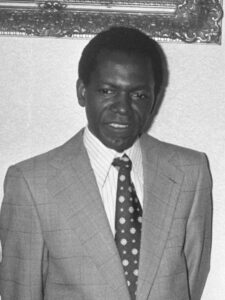
© |
|
Bernard Mouralis – L’Europe, l’Afrique et la folie
– Philosophy & Postcolonialism –
|
Summary: From the production of discourse on Africa emerging in Europe from the 16th century, this reflection shows how African and West Indian writers responded to this discourse, making it move from the imaginary to the symbolic by attempting to develop a theory of madness within a dominated society (Fanon). Far from being the affirmation of a singularity or a stigma, madness finally appears as a claim to belong to humanity, because in the end, nothing is more human than madness and illness. |
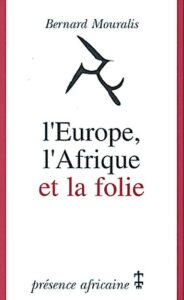 |
|
Publication: Présence Africaine, 1993 Bio: Bernard Mouralis is a prominent figure of Francophone and Postcolonial studies in France. Link to the book on Présence Africaine: Here Rights inquiries: Here |
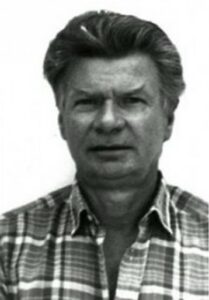
© Présence Africaine |

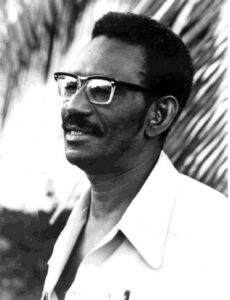 © Présence Africaine
© Présence Africaine